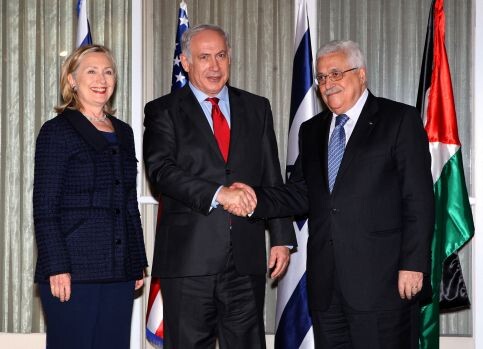The Electronic Intifada 23 January 2011

Leaked documents reveal the “charade” of the peace process between the PA and Israel. (Thaer Ganaim/MaanImages)
The Al Jazeera network has begun to release documents it secretly obtained that expose dramatic concessions made by the Ramallah-based Palestinian Authority (PA) to the Israeli government and US officials.
The leaked files, which Al Jazeera has dubbed “The Palestine Papers,” contain more than 1,600 internal documents related to the last decade of peace negotiations. The network has also shared the information with the Guardian newspaper in London.
“These documents — memos, e-mails, maps, minutes from private meetings, accounts of high level exchanges, strategy papers and even power point presentations - date from 1999 to 2010,” Al Jazeera stated in its introduction to the report (“Introducing the Palestine Papers,” 23 January 2011).
On Sunday, Al Jazeera released documents that prove the PA’s willingness to concede areas of occupied East Jerusalem to the Israeli state. The Electronic Intifada’s co-founder and Executive Director, Ali Abunimah, was given special access to the documents and helped analyze them for Al Jazeera.
Speaking from Al Jazeera headquarters in Doha, Qatar, Abunimah said “The cover has finally been blown on a ‘peace process’ where there has been no transparency, honesty or accountability to the Palestinian people by those who claimed to negotiate in their name. What saddened me most as I reviewed hundreds of documents was to see how Palestinian negotiators — with no mandate from the Palestinian people — viewed the basic rights and interests of the Palestinian people not as objectives to be secured, but as obstacles to be fudged or mere bargaining chips to be frittered away to secure a ‘deal’ that could save the skins of the Palestinian Authority at almost any price.”
Among Al Jazeera’s significant revelations are major offers by the PA to Israel in the context of settlements in East Jerusalem, including major portions of the Old City that adjoin the Haram al-Sharif (the Dome of the Rock, the second-holiest site in Islam) (“’The biggest Yerushalayim,’” 23 January 2011).
During a January 2010 meeting with David Hale, advisor to US President Obama, PA Chief Negotiator Saeb Erekat was quoted in the documents leak saying that in his plan, Israel would be given “the biggest Yerushalaim [the Hebrew name for Jerusalem] in Jewish history.”
Even as Israeli leaders repeated their unwillingness to negotiate on the issue of Jerusalem, Al Jazeera reveals, Palestinian Authority officials kept offering concessions on areas in the city, without demanding Israeli concessions in return.
In the meeting with Hale, Erekat said: “Israelis want the two-state solution but they don’t trust. They want it more than you think, sometimes more than Palestinians. What is in that paper gives them the biggest Yerushalaim in Jewish history, symbolic number of refugees return, demilitarized state … what more can I give?”
PA leaders also proposed “unprecedented” land swaps with the Israeli government, Al Jazeera revealed.
In 2008, then-Israeli Prime Minister Ehud Olmert met with PA President Mahmoud Abbas after the PA offered to allow the Israeli state to annex most of the East Jerusalem settlements without demanding concessions in return. Olmert reportedly showed Abbas a map of the newly-proposed swaps, which outlined Israel’s plan to annex more than 10 percent of the West Bank.
This map included the annexation of major settlement blocs such as Maale Addumim and Ariel “in exchange for sparsely-populated farmland along the Gaza Strip and the West Bank,” Al Jazeera stated (“The ‘napkin map’ revealed,” 23 January 2011).
“Abbas was not allowed to keep a copy of the map, and so the 73-year-old Palestinian president had to sketch a copy by hand on a napkin,” the network added.
According to Al Jazeera, the Palestinian negotiations team “did not explicitly endorse or reject the Olmert offer … it did warn that continued settlement growth [particularly in East Jerusalem] would make any agreement ‘much more difficult.’”
In an article on the Al Jazeera English website, Daud Abdallah, director of media research institution Middle East Monitor, reported that the PA was willing to “disown parts of the besieged Arab neighborhoods in the city” (“‘Shocking revelations’ on Jerusalem,” 23 January 2011).
“Worse still,” Abdallah wrote, “Saeb Erekat … displayed clear ‘flexibility’ regarding the sovereignty on the Haram al-Sharif.”
Al Jazeera revealed that Erekat offered “creative” suggestions on the legal status of the Old City and Palestinian land in occupied East Jerusalem, including the Haram al-Sharif.
In mid-October, 2009, Erekat told Hale and US State Department legal adviser Jonathan Schwartz, “Even the Old City can be worked out except for the Haram and what they call Temple Mount. There you need the creativity of people like me …”
Abunimah, who will provide on-air analysis about the documents on Al Jazeera English during four days of coverage, said that, “What we can discern immediately from these documents is that the US-brokered negotiations, especially under the Obama administration, can never lead to the restoration of Palestinian rights and that the two-state solution is basically dead. In the long term, we will have to ask how the peace process charade, revealed in these papers, was allowed to continue for so long as Israel continued its relentless colonization of Palestinian land and the Palestinian Authority that was supposed to be a step on the road to freedom become a sophisticated tool of continued Israeli occupation.” Â
More Palestine Papers documents will be released in the coming days.
Later this week, the network said it will expose details about compromises the PA has considered regarding the Palestinian refugees’ right of return, as well as detailed information on the “security cooperation” plans between the PA and Israel.
Additionally, documents including “private exchanges between Palestinian and American negotiators in late 2009, when the Goldstone report [on the 2008-09 Israeli assault on Gaza] was being discussed at the United Nations” will be released, Al Jazeera stated.
“The material is voluminous and detailed,” the network said. “It provides an unprecedented look inside the continuing negotiations involving high-level American, Israeli, and Palestinian Authority officials.”
The entire Palestine Papers archive is being made available online on the Al Jazeera English website: http://english.aljazeera.net/palestinepapers/.
Related Links


